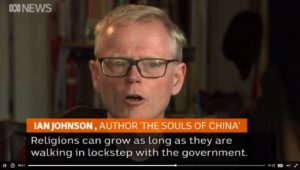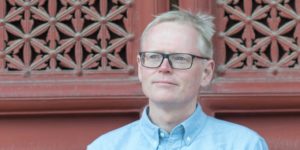 |
| Ian Johnson at a recent speech in Abu Dhabi |
Foreign media mostly focus on China's crackdown on religion, but it's approach has become much more nuanced, says journalist Ian Johnson, author of The Souls of China: The Return of Religion After Mao, at the New York Times. Two truly global religions, Islam and Christianity, cause China's leadership most trouble.
Ian Johnson:
More in the New York Times.
Ian Johnson is a speaker at the China Speakers Bureau. Do you need him at your meeting or conference? Do get in touch or fill in our speakers' request form.
Are you looking for more political analysts at the China Speakers Bureau? Do check out this list.
Xi Jinping’s rise to power in late 2012 marks a new era, the third, in the history of the Chinese Communist Party’s religious policies. Instead of the destruction of the Mao years and the relatively laissez-faire approach of the reform period, the state has embarked on a form of highly curated revivalism.
One part of its approach rests on a deep suspicion of Christianity and Islam. The party’s policy toward Islam has been the most draconian. Some believers, especially Uighurs in the northwestern province of Xinjiang, have been subjected to a policy of forced secularization. This has included sending hundreds of thousands of Muslims to re-education camps, compelling restaurants to serve pork and alcohol, and forbidding fasting during Ramadan.
The policy toward Christianity is more nuanced. Last year, Beijing struck a deal with the Vatican to jointly appoint Catholic bishops. The Vatican seemed to hope to reverse the decline in the number of Catholics in China. But for Beijing, the measure was a way to tighten control over the Catholic clergy — and, by extension, the church itself.
Protestantism poses an especially vexing problem for the party. It is arguably China’s fastest-growing religion, with an estimated 60 million or more adherents today (compared with one million in 1949), including some 20 to 30 million who are thought to worship in unregistered (or underground) Protestant churches. But the faith lacks a unifying structure that would allow for negotiations. And so the government has fired a few shots across the bow, closing several of the country’s best-known underground churches.
In many ways, however, the Xi administration’s embrace of traditional faiths is more radical. Since taking office, the president has met with Buddhist leaders, and his government has allowed Taoism to flourish. The state recently issued a landmark plan to improve social mores, the first such program since 2001.
The plan stems from a widespread feeling that China’s relentless drive to get ahead economically has created a spiritual vacuum, and sometimes justifies breaking rules and trampling civility. Many people do not trust one another. The government’s blueprint for handling this moral crisis calls for endorsing certain traditional beliefs.
Ian Johnson is a speaker at the China Speakers Bureau. Do you need him at your meeting or conference? Do get in touch or fill in our speakers' request form.
Are you looking for more political analysts at the China Speakers Bureau? Do check out this list.





